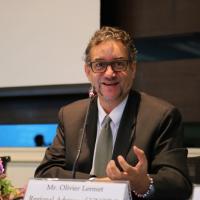ONCB joined hand with INCB and UNODC to launch the INCB Annual Report for 2016
News / View / ASEAN Information
Friday 3rd of March 2017
ONCB joined hand with INCB and UNODC to launch the INCB Annual Report for 2016

On Friday 3rd March 2017 at 09.30 hrs. Mr. Niyom Termsrisuk, Deputy Secretary-General, NCB in collaboration with Dr. Viroj Sumyai, Vice-President of International Narcotics Control Board (INCB) and Mr. Olivier Lermet Regional Advisor of United Nations Office on Drugs and Crime (UNODC) organize the Launch of INCB Annual Report for 2016. In this regards, there are 3 major presentations, namely, presentation on Illicit Drug Trends in East and Southeast Asia by Mr. Inshik Sim, Information Analyst of UNODC, Presentation on Drug Policy in Southeast Asia by Mr. Olivier Lermet and presentation on INCB Annual Report of the Year 2016 by Dr. Viroj Sumyai.
As many Countries registered disproportionate rise in overdose among females, INCB REPORT of the Year 2016 calls for Drug policies that take woman into account. There are key points in this report as follows:
• Calls for gender-sensitive drug policies and programmes, better health-care access for drug dependent women and more funding to prevent and treat drug abuse among women
• Condemns the extrajudicial targeting of people suspected of illicit drug-related activity
• Calls on States to abolish the death penalty for drug-related offences
• Encourages States to consider alternatives to imprisonment for minor drug-related offences
• Reaffirms that legalizing cannabis for non-medical use is incompatible with international legal Obligations
At a time when countries are reporting a disproportionate increase in drug overdoses among women, the Vienna-based INCB in its Annual Report for 2016 is calling on Governments to do more to take women into account in their drug policies and programmes. INCB stresses i n its Report, published today, that Governments should give priority to providing health-care access for drug-dependent women and calls for more funding and coordination to prevent and treat drug abuse among women.
INCB President Werner Sipp said: “We want to change perceptions and remind people, particularly policymakers, of the importance of protecting the rights of women who use drugs or who have committed drug-related offences and the rights of their families.”
Women and girls comprise one third of global drug users, with levels of drug use higher among women in high-income countries. However, just one fifth of treatment recipients are women, as significant systemic, structural, social, cultural and personal barriers affect women’s ability to access substance abuse treatment.
Compared to men, women are more likely to be prescribed narcotics and anti-anxiety medication, and are consequently more likely to abuse such medication. For example, Germany and Serbia have reported that fatal overdoses from prescription drugs are more frequent among women. Additionally,countries such as the United Kingdom of Great Britain and Northern Ireland have seen larger increases in overdoses, of all substances, among women than among men.
The INCB Annual Report is a significant report that can provide us comprehensive and reliable information on the current global situation and trends of drugs, psychotropic substances, precursor chemicals, and measuresto control those substances as well as some major calls from international community.
Mr. Niyom Termsrisuk, Deputy Secretary-General, NCB in his welcome remarks mentioned that drug problems became a serious threat to all countries around the globe, especially the countries that share borders and locate near drug producing sources. Large amounts of illicit drugs were smuggled from those sources into the connected countries every year. This means that essential precursor chemicals are still available for drug producers who are trying to divert those substances from licit sources to drug production. The use of non-schedule narcotic substances as well as precursor chemicals is increasing. There are many innocent people involved in drug trade or be victims of drug abuse. Thailand, therefore, applied new approach on the drug control policy by engaging public health led issue as a basis for providing drug treatment services. This is in line with the INCB report that will be presented shortly regarding gender sensitive drug policies and health care access for drug dependent with the focus on women. In this regard, the sharing of information on the use of those substances is vital for the monitoring which will lead to further control of those substances.





